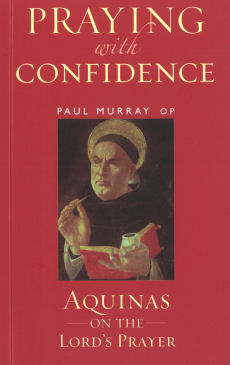
|
Posted July 14, 2011
Book: Praying with Confidence: Aquinas on the Lord's Prayer Author: Paul Murray, OP Continuum. New York. 2010. Pp. 108 An Excerpt from the Jacket:
An Excerpt from the Book: And lead us not into temptation In contemporary spirituality it is almost a commonplace to think of the spiritual or the mystic life as a way of coming to experience God. But, in Sacred Scripture what is of far greater importance is what we might call God's experience of us. God's testing of us, God's thirst for our attention and our love. St. Thomas, in his commentary on Psalm 16, writes: "When God examines, he does three things, namely, he tests, he visits, he examines." What is more, as a result of this testing, as soon as God finds that an individual possesses a certain integrity, there begins the deeper testing, the more searching examination. Thomas cites Jer. 17.10: I, the Lord, search the heart and probe the loins. I give everyone according to his way. Finding oneself under this kind of mysterious, divine scrutiny is a wonderful sign of grace and of progress in the spiritual life. But the experience itself is not ‘wonderful'. Thomas notes: "this examination is severe and strong, and so much so that no one would withstand it unless helped by God. Here, St. Thomas's way of speaking about the spiritual life recalls, in some measure, the vivid language St. John of the Cross uses in his work when attempting to describe the experience of the dark night of purification. So can we say, therefore, that St. Thomas is of one mind on this subject with the Carmelite mystic? Does the Dominican really believe our human nature is such that it requires this sort of radical transformation? Is he not the theologian who famously declared that grace does not destroy nature but rather perfects it? Well, St. Thomas is indeed the great Christian humanist who made this declaration. But we must be careful not to glide too quickly, or too easily, over what is involved, in practice, in the perfecting of our nature, and forget or deliberately ignore how purifying and demanding that process can be. When St. Thomas, in the text we have been considering, comes to describe the experience of being tested, he uses the same images that we find repeated over and over again in the work of St. John of the Cross, namely night and fire. Commenting on the phrase, ‘Visitasti nocte, You have visited me by night', Thomas notes: ‘This visitation can be understood by night and fire because both disturb the soul. (Job 30. 17) By night my bone is pierced with sorrows: and fire does the same. In the end, what the examination by fire demonstrates is, according to Thomas, ‘whether or not the person [undergoing the trial] is a true friend [bonus amicus], someone who does not withdraw. Table of Contents: 1. Our Father 2. Who art in Heaven 3. Hallowed by thy Name 4. Thy kingdom come 5. Thy will be done on earth as it is in heaven 6. Give us this day our daily bread 7. And forgive us our trespasses as we forgive those who trespass against us 8. And lead us not into temptation 9. But deliver us not into temptation 10. Amen |
|
